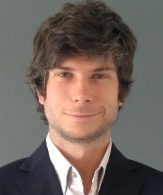Previous page
 Thomas ANDRILLON
PhD, CR1 - Inserm
Team "Normal and abnormal motor control: movement disorders and experimental therapeutics"
https://movit-paris.webflow.io/
https://twitter.com/thandrillon
Thomas ANDRILLON
PhD, CR1 - Inserm
Team "Normal and abnormal motor control: movement disorders and experimental therapeutics"
https://movit-paris.webflow.io/
https://twitter.com/thandrillon
 Thomas ANDRILLON
PhD, CR1 - Inserm
Team "Normal and abnormal motor control: movement disorders and experimental therapeutics"
https://movit-paris.webflow.io/
https://twitter.com/thandrillon
Thomas ANDRILLON
PhD, CR1 - Inserm
Team "Normal and abnormal motor control: movement disorders and experimental therapeutics"
https://movit-paris.webflow.io/
https://twitter.com/thandrillon
Biography
Career path- 2006 : Scientific High School Diploma at Lycée Louis Barthou (Pau, 64).
- 2006-2008 : Preparation classes for the Grandes Ecoles at the Lycée Pierre de Fermat (Toulouse, 31).
- 2008-2012 : Student at the École Normale Supérieure (Paris, France)
- 2009 : Bachelor's degree in Biology (Pierre and Marie Curie University, Paris, 75).
- 2009-2012 : Master of Research in Cognitive Sciences (École Normale Supérieure, Paris). Mention Very Good (ranking : 2/37). Thesis director: Giulio Tononi.2009 Bachelor's degree in Life Sciences (UPMC, Paris).
- 2012 : Diploma from the École Normale Supérieure (Speciality: Cognitive Sciences, Minor: Biology).
- 2016 : PhD in Neuroscience (Université de Recherche Paris Sciences et Lettres). Title: "The sleeping brain at work: perceptual processing and learning during sleep in humans". Thesis director: Sid Kouider.
- 2017-2019 : Post-Doctoral Researcher at the University of New South Wales (Sydney, Australia) and at Monash University (Melbourne, Australia)
- 2019-2021 : Lecturer at Monash University (Melbourne, Australia)
- 2021 : Inserm Research Fellow at the Paris Brain Institute Scientific field: Cognitive sciences, sleep, consciousness, attention
Research work
Every night, when we fall asleep, we lose awareness of the world around us, sometimes immersed in an unconscious sleep, sometimes transported by our dreams. My work seeks to identify the physiological mechanisms responsible for such disruptions. Through the exploration of the mechanisms and functions of sleep, I also seek to grasp the neurological basis of consciousness. I study the physiology of sleep, from the single neuron to the whole brain activity, and how sleepers respond to external sensory information. My work has shown that some aspects of sleep physiology are locally regulated at the cortical level: for example, while some regions show clear signs of deep sleep, others may be closer to wakefulness. I also studied how this "local sleep" affects cognition and consciousness. Interests : Sleep, consciousness, attention, dreams, electroencephalographyPublications
- Predicting lapses of attention with sleep-like slow waves
Andrillon, Burns, MacKay, Windt & Tsuchiya. Nature Communications (2021)
- Sleepers track informative speech in a multitalker environment
Legendre*, Andrillon*, Koroma & Kouider. Nature Human Behaviour (2019)
- Selective neuronal lapses precede human cognitive lapses upon sleep deprivation
Nir, Andrillon, Marmelshtein, Suthana, Cirelli, Tononi* & Fried*. Nature Medicine (2017)
- Formation and Suppression of Acoustic Memories during Human Sleep
Andrillon, Pressnitzer, Léger & Kouider. Nature Communications (2017)
- Single-neuron activity and eye movements during human REM sleep and awake vision
Andrillon*, Nir*, Cirelli, Tononi & Fried. Nature Communications (2015)


